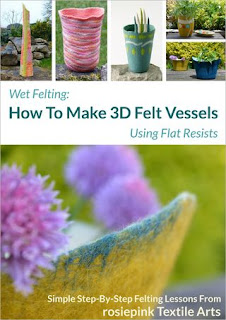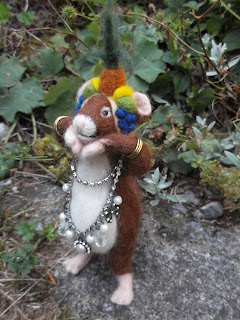Animal welfare is extremely important to me, and as a needle felter, I owe it to my animal friends to only use ethically produced, cruelty free wool. Finding it however was another matter! Back when I first started needle felting and I didn't know any different, I did use Merino wool, and now I literally shudder at the thought. (there are lots of links about Merino wool and animal welfare on the net and some links below) But when I found out about it, I stopped using it and I would never use it again.
I decided the best way to find the ethically produced fibre that I needed was to try and source it locally. Luckily I found it and I now have a few people who raise their animals well, in excellent conditions and the animals are not raised for consumption. If you want to find ethically produced fibre it helps if you live in a rural area and you can ask around locally, but if you don't, it's a case of contacting farms as close to where you live as is possible. It's a lot of research but worth it when you find what you're looking for! It's just a shame that ethically produced wool is not widely available. This is something that needs to be addressed.
However, one UK farm are making a difference.
Newmoor Barn The Ethical Fibre Company, based on the borders of Devon and Cornwall are committed to producing and selling cruelty free fibres.They supply ethical wool tops and wool batts as well as raw and washed fleece for felting, spinning and fibre art needs.
Here is a fantastic information sheet produced by Newmoor Barn, titled 'Know your Fibre' NB the photos that accompany the article are all of beautiful fleece that can be purchased from Newmoor Barn. There are lots more for sale on their website too at www.newmoorbarn.com)
Know Your Fibre By Amanda Braggins of Newmoor Barn
Imagine a world where fibre artists can have access to a fabulous range of
natural animal fibres and textures in a wide array of beautiful
colours but be able to have the piece of mind that the animals that
supplied the fibre have been treated with care and respect.
It’s very easy for an artist to get caught up in the wealth of colour and
textures begging to be purchased to create beautiful fibre and
textile art with little thought into what happens in growing and
processing these raw materials as we use them to create our beautiful
and wonderful creations.

We are constantly being encouraged to consider where other important items
in our life come from. Air miles on Fruit and Veg, human exploitation
issues on cheap clothing and animal welfare in the provision of meat
and eggs, not to mention the oil industry. But why as artists are we
not considering these same issues when it comes to our fibre? The
last time you purchased fleece did you know where the fibre came
from? The animal? The farm? Or even the country it came from? Can you
be sure the animal was treated with care and respect? Do you think
your art would look the same if you knew it hadn’t?
Lured bythe bright colours wonderful textures or the cheap price? In the
current economical climate we are all on the lookout for bargains and
deals in all areas of our life but surely we have a duty to make
sure that when we do get a bargain it’s not at the expense of
another human beings or an animals freedom, happiness or safety.

At Newmoor barn we raise a herd of happy Angora goats. Using their mohair to
produce a range of art and crafts products and we know that raising
happy healthy animals takes time, dedication and money and produces
a superior product.
We also source and buy a variety of fleece from local farmers to wash, dye
and card to sell to artists. We buy direct from small local farms so
that we can inspect each individual fleece and know the animal it
came from, pay a fair price, and ensure we only buy fleece where we
can see the animals are treated with care and respect.
We process our fibres by hand on our small farm, no factories full of machinery
and underpaid workers here, (just us, smiling!)But its not
all dome and gloom. There are ethical supliers out there. These
natural fibres also tend to be of a higher quality as they come from
animals with freedom to roam allowing good nutrition. These fleeces
are often processed on an individual basis rather than being thrown
in with other fleece. If a farmer has thousands of sheep can they
really keep on top of issues such as foot rot, fly strike, lice,
worms? This often leads to cruel practices such as mulesing in the
merino population. Are we prepared to let an animal suffer just so we
can have that particular look?
You are spending time making wonderful pieces that you have designed and
handcrafted and don’t wanted it tainted by the oppression and
neglect of the animals, the farmers, people who process it, or the
planet.

Know where your fibre comes from and care where your fibre
comes from and the next time you pass a field of sheep give them a
nod and thank them for their fibre.
For more information on animal welfare issues surrounding the fibre industry
you can check out our website at
www.newmoorbarn.com
Merino wool information links:
A Link to PETA
Blog from frankandfaith - The Truth behind Merino Wool
A Link to PETA
Beautiful items created with ethically produced fleece from Newmoor Barn....
 |
| Dark Woods Felted Wall Hanging, Felt Picture made with ethical fleece |
 |
| Earth Tones Mohair Shoulder Bag made with our own vegetarian mohair |
 |
| Flowers Pink and Purple made with ethical fleece |
Some of the residents at Newmoor Barn. Living the good life! :)
 |
| goats climbing trees |
 |
| Barry The Angora Goat Kid |
 |
| Angora Goats enjoying the evening sun |




















































